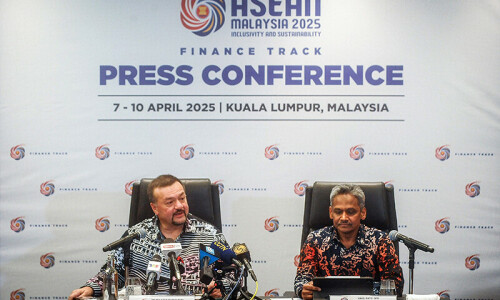ISLAMABAD: The government cleared on Friday the Rs486 billion first phase of the Dasu Hydropower Project to pave the way for approval of a $700 million loan by the board of directors of the World Bank.
The WB board is expected to approve the loan in May and a government team led by Finance Minister Ishaq Dar will brief the bank’s management about the project during its spring meetings scheduled for April 11-13 in Washington.
Mr Dar has said that the WB has agreed to provide $1.7bn to Pakistan, including $700m for the Dasu project.
On Friday, a meeting of the Executive Committee of the National Economic Council (Ecnec), presided over by the finance minister, approved a rationalised cost of Rs486bn for the Dasu Hydro Power Project (Stage-I) with a foreign exchange component of Rs218.5bn.
To be located in upper Kohistan district of Khyber Pakhtunkhwa, the total generation capacity of the entire project (phase-1 and 2) is estimated at 4,320MW.
The stage I envisages construction of a 2,160MW hydropower project and acquisition of land, including resettlement, construction of offices, colonies, project access roads and pre-construction activities. The stage will be completed in five years. The project will generate electricity at a cost of Rs2.14 per unit.
Ecnec constituted a committee comprising representatives of the ministries of planning and development, water and power and finance and of Wapda and the Khyber Pakhtunkhwa government to monitor issues relating to land acquisition for ensuring propriety of the land cost. It was further decided that the Ministry of Water and Power would confirm that it had obtained a no-objection certificate from environment protection authorities.
According to Wapda Chairman Syed Raghib Abbas Shah, the World Bank has arranged financing of $4.2bn required for the first phase of the project.
He said the phase would comprise two tunnels and generation would increase to 4,320MW on completion of the second phase by 2019.
It is the first project in Pakistan for which the World Bank has also agreed to finance land acquisition. Mr Shah said the German government would provide $1b, Industrial and Commercial Bank of China (ICBC) $2bn and the World Bank $700m, while the remaining $500m would be arranged by the government and the Water and Power Development Authority from their own resources.
The committee also approved the 34.5MW Harpo Hydropower Project at a modified cost of Rs9.5bn with a foreign assistance of Rs6.1bn. Wapda will be responsible for the construction of the project in Skardu district. The project will be completed in four years.
The AFD of France and KFW of Germany will finance the project through a loan of 70 million euros and the additional cost will be met by Wapda. The project includes laying of 132kV double circuit transmission lines from the site to Skardu.














































